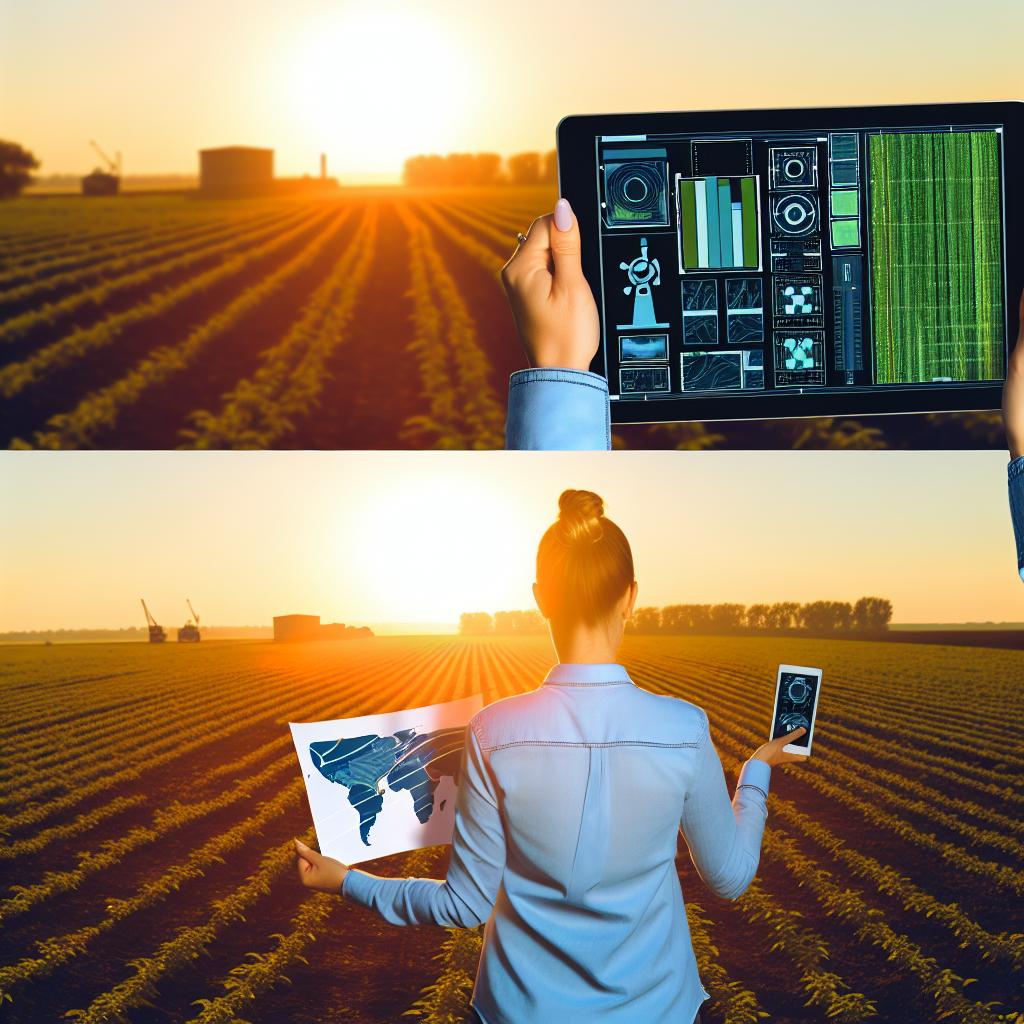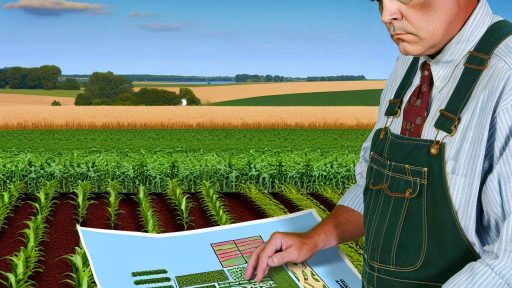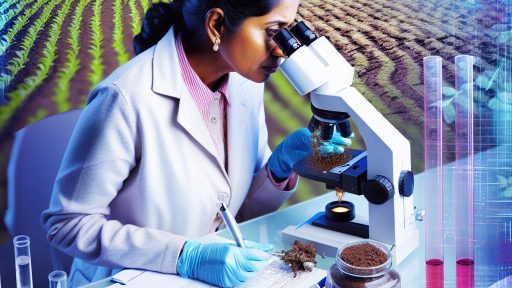Introduction to Precision Agriculture and its Benefits for Crop Management
Precision agriculture enhances farming practices through advanced technology.
This approach utilizes data-driven decisions to optimize crop yields.
Furthermore, it minimizes waste and ensures efficient resource usage.
Defining Precision Agriculture
Precision agriculture refers to managing crops using precise techniques.
It involves the use of GPS, sensors, and big data analytics.
Farmers can monitor field variability effectively through this approach.
Key Benefits of Precision Agriculture
One major benefit is improved crop management efficiency.
Farmers can target specific areas for fertilization and irrigation.
This targeted approach reduces input costs and maximizes yields.
The Role of Data in Precision Farming
Data collection is central to precision agriculture practices.
Farmers gather information on soil health, weather patterns, and crop health.
Ultimately, this data guides informed decision-making throughout the season.
Environmental Sustainability
Precision agriculture promotes environmental sustainability.
By reducing chemical usage, it minimizes adverse environmental impacts.
Also, it conserves water and improves soil health over time.
Transform Your Agribusiness
Unlock your farm's potential with expert advice tailored to your needs. Get actionable steps that drive real results.
Get StartedEconomic Impact on Crop Yield
The economic benefits of precision agriculture are substantial.
Farmers experience increased profitability through higher yields.
Additionally, reducing waste leads to more sustainable practices.
Overview of Real Estate Strategies in Agricultural Context
Real estate strategies influence agricultural productivity significantly.
Farmers must assess land suitability for various crops.
This assessment includes soil health, topography, and water availability.
Moreover, proximity to markets and transportation also matters.
Farm location affects farmers’ access to resources and infrastructure.
Strategic site selection enhances crop yield and profitability.
Evaluating Land Potential
Potential land evaluation involves several critical factors.
Firstly, soil type plays a vital role in determining crop success.
Next, water resources must be analyzed for irrigation feasibility.
Also, land topography impacts machinery operation and accessibility.
Finally, surrounding land use gives insight into market opportunities.
Leasing vs. Buying Agricultural Land
Farmers often face the decision of leasing or buying land.
Leasing offers flexibility and lower initial investment costs.
Conversely, purchasing land provides long-term security and control.
Financial evaluations are crucial for making this decision.
Understanding cash flow implications aids in choosing the right option.
Utilizing Real Estate Trends
Awareness of current real estate trends supports better investment strategies.
Monitoring market demand helps predict land values effectively.
Additionally, tracking agricultural policy changes informs decision-making.
Engaging with local real estate experts provides valuable insights.
Networking within the agricultural community fosters strategic partnerships.
Showcase Your Farming Business
Publish your professional farming services profile on our blog for a one-time fee of $200 and reach a dedicated audience of farmers and agribusiness owners.
Publish Your ProfileLeveraging Sustainable Practices
Sustainable farming practices can enhance land value.
Implementing organic farming methods may attract premium prices.
Moreover, preserving natural habitats contributes to environmental health.
Integrating sustainability into business models appeals to eco-conscious consumers.
This strategy fosters long-term profitability and land preservation.
Case Studies: Successful Integration of Precision Agriculture and Real Estate
FarmTech Investments in Iowa
FarmTech Investments transformed a struggling farm in Iowa.
By using precision agriculture techniques, they optimized crop yields.
The company utilized satellite imagery and soil sensors for analysis.
This data-driven approach led to more informed decision-making.
As a result, crop production increased by 30% in the first year.
Additionally, they implemented smart irrigation systems.
This innovation reduced water costs significantly.
FarmTech’s integration of real estate strategies ensured land value appreciation.
Green Fields Realty in California
Green Fields Realty partnered with local farmers in California.
They focused on sustainable practices to increase land attractiveness.
Through workshops, they educated farmers on precision agriculture.
Moreover, real estate investments supported necessary infrastructure improvements.
This collaborative approach led to enhanced community value.
Farmers reported higher profits due to increased efficiency.
Furthermore, local property values soared as demand increased.
Haven Farms and Technological Integration
Haven Farms in Oregon adopted advanced technology for crop management.
They integrated drones into their farming operations for monitoring.
This allowed for immediate identification of crop issues.
Subsequently, their response times improved, enhancing yields.
In addition, Haven Farms worked closely with real estate developers.
They focused on zoning regulations favoring agricultural land use.
This strategic alignment improved access to funding and resources.
AgriSmart and Renewable Energy Solutions
AgriSmart in Texas combined precision agriculture with renewable energy.
They implemented solar panels to power irrigation systems.
This reduced their operational costs significantly.
Furthermore, AgriSmart collaborated with real estate sectors on sustainability.
The partnership promoted eco-friendly practices, attracting investors.
As a result, land values increased due to the sustainability focus.
Investors viewed the integrated model as a viable long-term option.
You Might Also Like: Greenhouse Expansion for Rural Land Investments
Technology Tools: How Drones, Sensors, and Data Analytics Play a Role
Drones in Agriculture
Drones enhance efficiency in modern farming practices.
Farmers utilize them for crop monitoring and mapping.
Additionally, drones can assess crop health through aerial imagery.
This technology provides real-time data for informed decision-making.
Sensors for Soil and Crop Management
Sensors are crucial for precision farming.
Showcase Your Farming Business
Publish your professional farming services profile on our blog for a one-time fee of $200 and reach a dedicated audience of farmers and agribusiness owners.
Publish Your ProfileThey collect vital data about soil moisture and nutrient levels.
These insights allow for tailored irrigation and fertilization practices.
Moreover, sensors contribute to more sustainable farming methods.
Data Analytics and Decision-Making
Data analytics transform raw data into actionable insights.
Farmers can identify trends and patterns that influence yield.
Advanced analytics tools help optimize resource allocation effectively.
This leads to increased productivity and reduced waste.
Integrating Technologies for Maximum Impact
Combining drones, sensors, and analytics creates a holistic farming approach.
This integration enables farmers to maximize resource efficiency.
Furthermore, it enhances crop success and sustainability.
By leveraging these technologies, the agriculture sector can thrive.
Uncover the Details: Precision Agriculture for Improving Soil Health in Farms
Evaluating Land Value
The Influence of Precision Agriculture on Land Appraisal
Precision agriculture changes how we value land for farming.
This innovative approach optimizes the use of land and resources.
As a result, it can significantly increase land value.
Land appraisers now consider precision technology in their evaluations.
This technology allows for more accurate assessments of crop yields.
Key Factors in Land Appraisal
Several factors now impact real estate appraisal in agriculture.
- The integration of advanced technology plays a critical role.
- Monitoring soil health through sensors provides valuable data.
- Yield mapping enhances understanding of productivity.
- Water management systems improve irrigation efficiency.
Benefits of Precision Agriculture for Land Value
Precision agriculture offers numerous benefits for landowners.
It increases crop production potential and sustainability.
Furthermore, enhanced data collection boosts buyer interest.
Investors are more likely to purchase land with proven productivity.
Market Trends and Their Implications
Current market trends highlight the value of precision agriculture.
Increased demand for high-quality produce drives land prices up.
Investors recognize the importance of technology in farming.
This drives a shift toward precision-equipped agricultural land.
Insights on Precision Agriculture’s Impact
Precision agriculture plays a pivotal role in land valuation.
It influences appraisal through enhanced data and efficiency.
As a result, land values continue to rise in this evolving market.
Uncover the Details: Fertilizer Management for Enhancing Soil Microbiology in the USA

Sustainability Practices
Balancing Profit and Environmental Responsibility
Sustainable agriculture focuses on the balance between profit and environmental responsibility.
Farmers can increase yields while minimizing environmental impact.
This approach encourages the use of smart technologies and practices.
Precision agriculture plays a key role in this transition.
It utilizes data analytics to enhance crop management and resource efficiency.
Moreover, sustainable farming techniques can improve soil health over time.
Implementing Sustainable Practices
To achieve sustainability, farmers can adopt various methods.
- Crop rotation prevents soil depletion and reduces pest outbreaks.
- Cover cropping enhances soil structure and fertility.
- Integrated pest management minimizes chemical use and supports biodiversity.
Additionally, using water-efficient irrigation systems conserves this precious resource.
These methods collectively contribute to a healthier ecosystem.
The Role of Real Estate in Sustainable Agriculture
Real estate strategies can support sustainable practices in farming.
Showcase Your Farming Business
Publish your professional farming services profile on our blog for a one-time fee of $200 and reach a dedicated audience of farmers and agribusiness owners.
Publish Your ProfileInvesting in land that promotes biodiversity and natural habitats is crucial.
Furthermore, choosing locations with access to resources, like water and markets, is essential.
This strategic approach enhances both agricultural potential and environmental stewardship.
Community Engagement and Education
Engaging with local communities can drive sustainable practices.
Farmers should lead educational initiatives on sustainability benefits.
Moreover, collaborating with local organizations can foster a shared commitment.
Partnerships encourage community support for sustainable farming efforts.
Ultimately, community involvement leads to a healthier agricultural environment.
Delve into the Subject: Best Practices for Weed Control in Residential Farmland Areas
Funding and Investment Opportunities for Integrating Precision Techniques
Understanding Precision Agriculture Investments
Investing in precision agriculture boosts crop yield and sustainability.
This field uses technology to enhance farming efficiency.
Farmers can harness data-driven insights to make informed decisions.
Investments in technology provide substantial returns.
Government Grants and Programs
Various government programs support precision agriculture initiatives.
The USDA offers grants for adopting modern farming techniques.
These funds help farmers purchase advanced equipment and software.
Additionally, local governments may provide matched funding opportunities.
Private Sector Investment
Private investors increasingly recognize precision agriculture’s potential.
Venture capital firms are funding tech startups in this sector.
Investors seek innovative solutions for agricultural challenges.
Promising startups attract attention by showcasing solid business models.
Collaborative Partnerships
Farming cooperatives can pool resources for technology acquisition.
Partnering with universities promotes research and innovation.
Collaborations lead to shared knowledge and reduced costs.
Successful partnerships can create strategic advantages for participants.
Return on Investment Analysis
Analyzing ROI is critical for potential investors.
Farmers must evaluate the long-term benefits of technology adoption.
Precision agriculture often leads to reduced input costs.
Higher yields can significantly improve profitability.
Challenges and Considerations
Investment in technology carries risks and challenges.
Farmers must stay informed about rapidly changing technologies.
Additionally, training is necessary for effective implementation.
Ensuring the adoption of precision techniques requires careful planning.
Future Trends: The Role of AI and Machine Learning in Agriculture Real Estate
Transforming Agricultural Practices
AI and machine learning are reshaping agricultural practices significantly.
They offer solutions for optimizing crop yields.
Farmers can utilize data analysis to make informed decisions.
This technology enhances resource management in real-time.
Consequently, it reduces waste and lowers operational costs.
Enhancing Property Evaluation
Artificial intelligence streamlines property evaluations in agriculture.
Machine learning algorithms can assess land value accurately.
Showcase Your Farming Business
Publish your professional farming services profile on our blog for a one-time fee of $200 and reach a dedicated audience of farmers and agribusiness owners.
Publish Your ProfileThey consider various factors such as soil health and climate conditions.
Furthermore, automated assessments save time and boost efficiency.
Predicting Market Trends
AI tools help predict market trends and agricultural demands.
These tools analyze historical data and current market dynamics.
As a result, farmers can adapt their strategies proactively.
Real estate investors benefit from better-informed decisions.
Improving Crop Management
Smart agriculture implements machine learning for crop management.
Farmers use sensors to gather data on crop health and soil moisture.
This data informs irrigation and fertilization choices.
Thus, it ensures optimal conditions for growth.
Cultivating Sustainable Practices
Machine learning aids sustainable farming techniques.
Farmers can monitor environmental impact through AI insights.
This guidance helps minimize harmful practices.
Moreover, sustainability attracts environmentally-conscious investors.
Additional Resources
Value of Data/Info & the Payoff of Precision Farming – Purdue …
Precision Agriculture and Water Conservation Strategies for …




